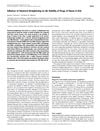 8 citations,
October 2014 in “Journal of analytical toxicology.”
8 citations,
October 2014 in “Journal of analytical toxicology.” Chemical hair straightening significantly reduces detectable drug levels in hair.
 8 citations,
July 2008 in “Facial Plastic Surgery Clinics of North America”
8 citations,
July 2008 in “Facial Plastic Surgery Clinics of North America” More men are getting non-surgical cosmetic treatments due to increased income and social acceptance, with less invasive options being preferred.
[object Object]  8 citations,
February 2003 in “Annals of Neurology”
8 citations,
February 2003 in “Annals of Neurology” Progesterone treatment improved seizures in a woman with menstrual cycle-related epilepsy, but a wrong medication worsened her condition.
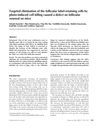 8 citations,
September 2002 in “Genes to Cells”
8 citations,
September 2002 in “Genes to Cells” Killing specific cells in hair follicles can lead to hair growth problems in mice.
 7 citations,
September 2017 in “Scientific Reports”
7 citations,
September 2017 in “Scientific Reports” Mice with too much sPLA₂-IIA have hair loss and poor wound healing due to abnormal hair growth and stem cell depletion.
 7 citations,
June 2015 in “The anatomical record”
7 citations,
June 2015 in “The anatomical record” Hexi cashmere goats' hair growth varies by stage, with Hoxc13 linked to hair activity.
 7 citations,
September 2014 in “European Journal of Dermatology”
7 citations,
September 2014 in “European Journal of Dermatology” Thicker hair grows faster; hair loss patients have slower growth.
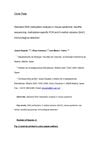 7 citations,
October 2013 in “Methods in molecular biology”
7 citations,
October 2013 in “Methods in molecular biology” These methods help understand DNA changes in mouse skin.
 6 citations,
October 2013 in “Plastic and Reconstructive Surgery – Global Open”
6 citations,
October 2013 in “Plastic and Reconstructive Surgery – Global Open” HSL treatment speeds up hair growth and reduces oxidative stress in hair follicles of ob/ob mice.
 6 citations,
January 2012 in “Breast cancer”
6 citations,
January 2012 in “Breast cancer” Breast cancer may be detectable through changes in scalp hair lipids.
 5 citations,
January 2020 in “Skin Research and Technology”
5 citations,
January 2020 in “Skin Research and Technology” Minoxidil 5% works better than 2% for hair growth in male-patterned hair loss.
 5 citations,
January 2017 in “Elsevier eBooks”
5 citations,
January 2017 in “Elsevier eBooks” The document concludes that cosmetics need biocompatible, eco-friendly ingredients due to aging populations and demand for effective products.
 5 citations,
August 2013 in “InTech eBooks”
5 citations,
August 2013 in “InTech eBooks” KLF4 is important for maintaining stem cells and has potential in cancer treatment and wound healing.
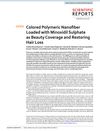 4 citations,
March 2020 in “Scientific Reports”
4 citations,
March 2020 in “Scientific Reports” Scientists created a colored thread-like material containing a common hair loss treatment, which slowly releases the treatment over time, potentially offering an effective, neat, and visually appealing solution for hair loss.
 4 citations,
May 2007 in “Oral and Maxillofacial Surgery Clinics of North America”
4 citations,
May 2007 in “Oral and Maxillofacial Surgery Clinics of North America” Understanding gender differences and individual patient characteristics is essential for optimal cosmetic surgery outcomes.
 3 citations,
October 2022 in “PloS one”
3 citations,
October 2022 in “PloS one” Scientists have developed a method to keep chicken feather follicles alive and structurally intact in a lab for up to a week.
 3 citations,
May 2016 in “International Journal of Research in Ayurveda and Pharmacy”
3 citations,
May 2016 in “International Journal of Research in Ayurveda and Pharmacy” Ayurveda, using herbs like ginger, garlic, and turmeric, can reduce chemo-radiotherapy side effects in cancer patients.
 2 citations,
March 2021 in “bioRxiv (Cold Spring Harbor Laboratory)”
2 citations,
March 2021 in “bioRxiv (Cold Spring Harbor Laboratory)” Hairless mammals have genetic changes in both their protein-coding and regulatory sequences related to hair.
 2 citations,
July 2020 in “Trends in Urology and Men's Health”
2 citations,
July 2020 in “Trends in Urology and Men's Health” More men are getting cosmetic surgery, with Botox and hair removal being popular, but these procedures have risks.
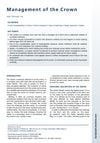 2 citations,
August 2013 in “Facial Plastic Surgery Clinics of North America”
2 citations,
August 2013 in “Facial Plastic Surgery Clinics of North America” Treat the front and middle scalp before the vertex in hair transplants, aim for good density, use non-surgical options for young people, and customize treatment for natural results.
 2 citations,
February 2003 in “Annals of Neurology”
2 citations,
February 2003 in “Annals of Neurology” Neuroimaging suggests that treatments targeting brain steroids could help control epilepsy, especially types linked to the menstrual cycle.
[object Object]  1 citations,
March 2023 in “bioRxiv (Cold Spring Harbor Laboratory)”
1 citations,
March 2023 in “bioRxiv (Cold Spring Harbor Laboratory)” Skin cell types develop when specific genes are turned on by removing certain chemical tags from DNA.
 1 citations,
January 2023 in “Research Square (Research Square)”
1 citations,
January 2023 in “Research Square (Research Square)” A neem-based herbal treatment worked better than ivermectin for sarcoptic mange in camels, improving their recovery and overall health.
 1 citations,
December 2022 in “bioRxiv (Cold Spring Harbor Laboratory)”
1 citations,
December 2022 in “bioRxiv (Cold Spring Harbor Laboratory)” Pangolins have lost some skin-related genes, but kept others, showing complex skin evolution.
 1 citations,
March 2019 in “International Journal of Cosmetic Science”
1 citations,
March 2019 in “International Journal of Cosmetic Science” The model predicts hair breakage based on key hair properties and helps product developers.
 1 citations,
August 2018 in “bioRxiv (Cold Spring Harbor Laboratory)”
1 citations,
August 2018 in “bioRxiv (Cold Spring Harbor Laboratory)” A new mutation in the TMEM173 gene and a risk allele in IFIH1 cause a unique set of immune-related symptoms.
 1 citations,
October 2017 in “Dermatologic Clinics”
1 citations,
October 2017 in “Dermatologic Clinics” Men are increasingly using energy-based skin treatments for workplace success, with lasers and other devices effectively improving skin and body appearance.
 1 citations,
February 2004 in “Medical Hypotheses”
1 citations,
February 2004 in “Medical Hypotheses” Certain cultural hair practices might cause baldness by affecting natural hair oils and stem cell delivery to hair follicles.
 April 2024 in “Frontiers in cellular and infection microbiology”
April 2024 in “Frontiers in cellular and infection microbiology” Blue light might help treat skin conditions by affecting the skin's bacteria.
 March 2024 in “World Journal Of Advanced Research and Reviews”
March 2024 in “World Journal Of Advanced Research and Reviews” Educators who survived COVID-19 faced physical, psychological, and social challenges but overcame them with resilience and support, highlighting the need for schools to provide better health and psychological care.






























